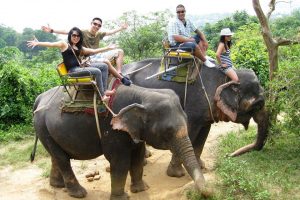
What sets Elephant Hills off from other trekking establishments are the beautifully looked after beasts and the perfectly trained Guides who are keen to impart knowledge about the conservation of the animals, their mahouts, and the methods of handling.
At Khao Sok Elephant Hills Camp, two choices of action filled stays are on offer, the Elephant Experience and the Elephant Trek.
The Elephant Experience at Elephant Hills, Phuket, Thailand
This is the one for those who want to get up close and personal with the animals, to interact with them while learning how the mahouts control their charges. All in the days work are preparation of the daily meals, feeding the elephants, scrubbing and cleaning them, and watching over them while they bathe (sometimes helping them in the water, hosing them down etc.). Their food must be carefully monitored as they must be fed dietary supplements, just like humans,to help their digestion and keep them well. Participants in the experience will also help to plant some of the next year’s food. The experience is a “live-in” with the elephants and does not include any trekking or sitting on the animals.
Elephant Trek at Elephant Hills, Phuket
For many people, an elephant trek is a lifetime’s desire, and this is one of the best places in Thailand in which to do it. Many so-called elephant treks are not that at all, being merely a ride on the back of an elephant – often at the wrong time of day for the animal. With Elephant Hills the rider can be sure that the whole ethos of the place is the conservation of both the animals and the area in which they live.
The area for trekking is in the nearby rainforest and the rides go through beautiful limestone Mountains. The diversity of the area becomes even more spectacular when experienced from the back of your “jungle tractor”.
The Elephants’ Place in Thailand
Thailand has approximately 3,000 elephants, a number that has declined over the years from around 100,000 at the turn of the last century. They are the most respected animal in Thailand, although people who see them with their mahouts in Bangkok begging in Sukhamvit, may find this hard to believe. Thais have worked with the animals for centuries, using them as carriers when they went into battle, as the aforementioned “jungle tractor” in the logging industry and to sometimes plough the rice fields instead of buffaloes.
Despite the ban on logging which came in 1989, the percentage of forested land declined from 80% to 15% today, not enough to give a living to the number of elephants and their mahouts who had been deprived of their livelihood.


